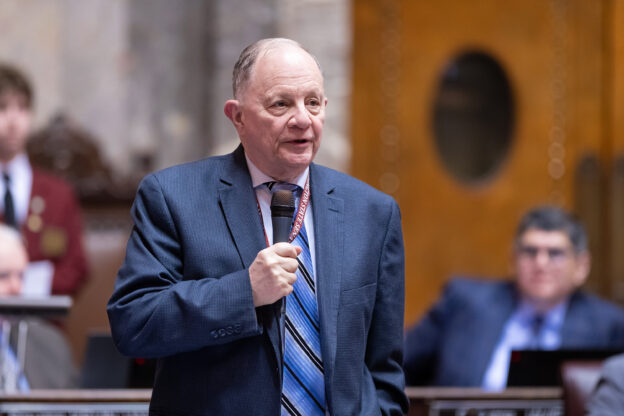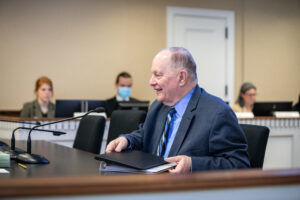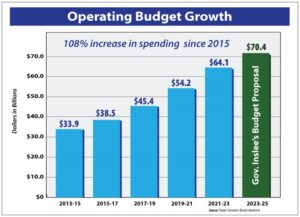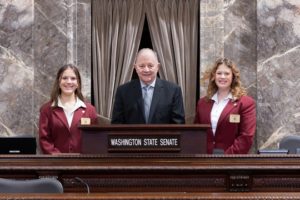
Note: The following e-newsletter was sent to Sen. Padden’s subscribers April 27, 2023. To subscribe to Sen. Padden’s newsletter, click here.
Dear friends and neighbors,
The Legislature ended its 105-day session Sunday night. As usually happens, the final days of the session focused on passing the final versions of the 2023-25 state operating, capital and transportation budgets, along with working out any disagreements on bills that were still alive.
One failure by the House Democrats was not approving a fix of the 2021 state law on drug possession penalties. There is more about this issue later in this newsletter.
I voted against the operating budget passed Sunday by the Legislature because of wasteful spending. In fact, the final operating budget was worse than the Senate’s version of this budget several weeks ago. It’s worth noting that all 40 House Republicans voted against the final operating budget.

State Capitol at dusk, with cherry trees in bloom.
First, the operating budget provides $15.5 million over the next two years for abortion-related services, including funding for “outreach, patient navigation, and staffing” at the Department of Health to implement the governor’s program to bring women to Washington from states that have abortion restrictions. During session, the governor announced his administration had spent millions of dollars to stockpile chemical abortion pills that may never be used before being discarded. It is very wrong to use taxpayer dollars to make Washington an “abortion destination state.”
Second, the operating budget includes $2 million in funding for yet another study involving the four lower Snake River dams. Doing another study of these dams is a waste of taxpayer dollars because the dams belong to the federal government, not the state, so it is a federal decision. Like other eastern Washington legislators and eastern Washington’s congressional delegation, I think the four Snake River dams in our state should not be breached.
Third, this budget does not provide widespread tax relief, especially property-tax relief. Many Washingtonians are being taxed out of their homes, and some property-tax relief, which the state can afford, would help many homeowners. While many other states, such as California and Idaho, have provided tax relief for their citizens in recent years, our Democrat governor and Democrat-run Legislature in Washington still refuse to return some money to hard-working taxpayers.
On the positive side, the new operating budget does not raise taxes, which is a welcome change from state spending plans in recent years.
Although the operating budget had problems, the new state capital and transportation budgets were worthy of support. Information about the capital budget’s funding of 4th District projects is found later in this e-newsletter.
This will be the last e-newsletter for a few weeks, but monthly e-newsletters will be sent out starting in late May or early June.
If you have questions about how to participate in state government this year or thoughts to share on anything in this e-newsletter, please give me a call or send me an email.
Thank you, as always, for the honor of serving as your state senator!
Best Regards,

Senator Mike Padden
Capital budget funds many 4th District projects
The two-year state capital budget unanimously passed by the Legislature includes many projects in the 4th Legislative District, allowing district residents to see their tax dollars at work in their local communities. The Senate version of the capital budget, which was better for the 4th District, prevailed in the negotiations between the Senate and House during the final days of session.
The capital budget funds these 4th District projects:
- $1.176 million for Spokane Valley Performing Arts Center construction, with another $1.849 million provided for the Spokane Valley Summer Theatre, which will be part of the performing arts center.
- $1.03 million for the HUB sports fields in Liberty Lake.
- $750,000 for Spokane Scale House Market in Spokane Valley.
- $543,000 for Avista Stadium improvements in Spokane Valley.
- $500,000 in Washington Wildlife Recreation Program funding for phase 2 work at Greenacres Park in Spokane Valley.
- $350,000 for a synthetic turf field in Liberty Lake.
- $207,000 for Veterans Memorial Balfour Park in Spokane Valley, with this funding having been repurposed from the 2022 state capital budget.
- $130,000 for natural areas facilities preservation and access.
- $100,000 for Mount Spokane Ski and Snowboard Park in Mead.
- $100,000 for the Spokane Valley Heritage Museum.
- $100,000 from the Building Communities Fund Grant Program for expansion of the public food business incubator.
- $40,000 to fund appraisals of two pieces of property: one in Liberty Lake that is being considered as the possible new location for the Army National Guard unit, and the other at Geiger Field, where the unit is located.
The capital budget funds the construction and maintenance of state buildings, public-school matching grants, higher-education facilities, public lands, parks, and other assets.
Thanks to Senate office staff

With my session staff, Ethan Mettlin (left) and Irina Dolbinina (middle).
A special thanks goes to my Senate office staff for their terrific work throughout the legislative session. Irina Dolbinina, who served as my office intern several years ago, returned this year to be my session aide. During session, Irina became my legislative assistant when my previous LA, Scott Staley, had to leave for family reasons. With this session over, Irina is returning to her law practice in Vancouver, Washington.
Ethan Mettlin began the year as my session intern, but he was promoted to session aide when Irina became legislative assistant. Ethan served the office well in his temporary position. Ethan is finishing his studies at Central Washington University.
Best of luck to Irina and Ethan in their future endeavors!
With their departure, Annalise Hemingway will become my new legislative assistant next Monday, May 1. Annalise was my intern in the 2022 session. She will work in my district office in Spokane Valley during the interim months. The district office phone number is 509-921-2460.
Updated 4th District government guide still available
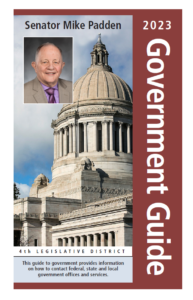
Every year or two, our office produces and mails a 4th District government guide to residents of our legislative district. With the help of my staff, we recently produced and sent out an updated government guide that includes helpful contact information on your local, state and federal government elected officials, as well as other government services. The online version of the new government guide can be found here.
If you did not receive the new government guide and would like a printed copy, please contact my district office at 509-921-2460, starting May 1.
No drug-possession bill passed at end of session

One of the failures of this session was the House’s inability to pass a bill that fixes a flawed law from two years ago that deals with punishment for drug possession.
In February 2021, in the state Supreme Court’s decision in State v. Blake, justices ruled Washington’s felony drug-possession statute was unconstitutional because it criminalized possession even when a person did not knowingly have drugs. The Blake decision essentially decriminalized the possession and use of drugs like heroin, methamphetamine and fentanyl.
After the Blake ruling, the Democrat-led Legislature passed a law in response to the decision. The new law reduced the criminal penalty for illegally possessing hard drugs from a felony to a misdemeanor. It is widely agreed that this law did not work, and it expires this year.
As a result of the expiring law, the Legislature this year needed to pass a new drug-possession law (known by some as the “Blake fix”) or else hard drugs literally will be legal in our state. Without a state law clarifying the penalties for possessing certain drugs, it is possible that cities and counties might enact their own drug-possession laws, creating inconsistent drug laws in which one city could have tough penalties on possession while a nearby city might not have any penalty at all.
The Senate passed its version of this proposal, Senate Bill 5536 in March. (I voted against it because possession of hard drugs like fentanyl, heroin and methamphetamine should be a felony. Making it a felony for hard-drug possession would provide leverage so people can get into successful treatment programs like drug court.) The Senate version declared that illegally possessing hard drugs is a gross misdemeanor while possessing other classes of drugs is a misdemeanor. Under the Senate-passed proposal, if a defendant successfully completes a pretrial diversion program, the drug-possession charge would be dropped and jail time is avoided. If someone is convicted of possessing drugs and agrees to an assessment and complies with drug treatment, the jail sentence is suspended.
On April 11, the House approved a different version of the bill, one that the Senate refused to accept. I was part of a six-member conference committee (four Democrats, two Republicans) that met late last week to work on a compromise version of the bill. However, when that compromise proposal reached the House floor Sunday night, it failed 55-43, as several Democrats and all of the Republicans voted against it. Had the Democrats on the conference committee implemented some of the Republican suggestions to the bill, I think many Republicans in the House would have voted for the compromise bill.
Legislature fails to make substantial progress against impaired driving

One of the failures this session was the House’s inability to pass meaningful legislation that would help combat impaired driving.
In the final days of the session, a bill that represented a significant step toward addressing impaired driving stalled because of inaction by House Democrats. Apparently, certain legislators did not want this stronger approach for one reason or another. As a result, our state likely will continue to see even more traffic accidents and traffic deaths because of impaired driving. The people of Washington deserve better.
According to statistics compiled by the Washington Traffic Safety Commission, Washington road deaths reached a 20-year high in 2021. There were 670 traffic deaths in 2021, including 272 fatalities involving drug-impaired driving and 155 deaths involving alcohol-impaired driving. In 2020, Washington had 574 traffic fatalities, including 214 involving drug-impaired driving and 135 involving alcohol-impaired driving. The commission has a current preliminary estimate of 745 traffic fatalities in 2022. No 2022 figures on traffic deaths involving drug- or alcohol-impaired driving are available yet, but I expect the number will be significant.
House Bill 1493 is the proposal that would have addressed impaired driving. The version passed by the Senate included language from Senate Bill 5032, my bipartisan measure that would expand the period for reviewing prior convictions of impaired driving to 15 years, from the 10 years now in state law, when determining whether a new offense of impaired driving is charged as a felony. Under SB 5032, any person who has three or more prior DUI offenses within that 15-year lookback period would face a felony, rather than the current penalty of a gross misdemeanor. SB 5032 would give offenders a chance to undergo a highly structured treatment program.
After the House refused to concur (or agree) with the Senate’s amended version of HB 1493, the Senate last week voted to recede from its original amendments to the bill and then added a floor amendment that included language found in SB 5032 before unanimously passing the newly amended HB 1493. In other words, the Senate passed the policy language for SB 5032 three times this session, and the Senate approved HB 1493 twice this year.
However, the House did not bring the latest version of HB 1493 to the floor for a vote before session adjourned Sunday night. The inaction by the House to bring it up for a vote is mind-boggling and a huge disappointment.
It was the third straight year that the life-saving policy found in SB 5032 had been approved by the Senate, only to be rejected by the House.
Another disappointment was the late decision to remove $400,000 from the 2023-25 state transportation budget – money to evaluate the outcomes and effectiveness of oral swab tests to detect alcohol/drug combination DUI violations. The evaluation would have been handled by the Washington Traffic Safety Commission, through a pilot program established before next March.
That funding would have allowed law enforcement to see how effective the oral-swab tests would help in determining if drivers were legally impaired. The funding was part of the Senate transportation budget plan, so it’s very disappointing that it was yanked out at the last minute.
Despite these setbacks, there was a measure of good news in the effort to curtail impaired driving. The new operating budget includes ongoing funding for drug courts; also, the operating budget and the new transportation budget together provide roughly a $6 million increase for toxicology labs, primarily to deal with backlogs and to open a new lab in Federal Way.
Earlier this week, KVI Radio talk-show host Ari Hoffman interviewed me about the inability of the House to pass House Bill 1493. We also discussed SB 5058, my bill to make it easier for smaller condominium buildings to be constructed. You can listen to that interview here.
Contact us!
If you have a question or concern about state government, please do not hesitate to contact our office. During the session we are conducting business from our Senate office in Olympia. We are here to serve you!
Phone: (360) 786-7606
Olympia Office: 215 Legislative Modular Building, Olympia, WA 98504-0404
Email address: Mike.Padden@leg.wa.gov
PLEASE NOTE: Any email or documents you provide to this office may be subject to disclosure under RCW 42.56. If you would prefer to communicate by phone, please contact Sen. Padden’s Olympia office at (360) 786-7606.
To request public records from Sen. Padden, please contact Randi Stratton, the designated public records officer for the Secretary of the Senate and Senate members.


















